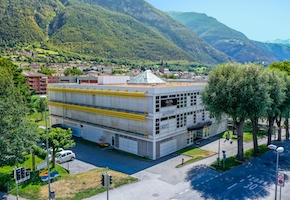- About
- Programs
- Innovation & Research
- Campus Life
- Career Services
- Admissions
- News & Events
- Alumni
Explore the Diverse Sectors of the Hospitality Industry
The various sectors of the hospitality industry—food and beverages, accommodation, travel, events, and entertainment—combine to create services that ensure guest comfort and memorable experiences.
Think of the hospitality industry as an ecosystem. Just as nature relies on that delicate balance of water, sunlight, and soil to sustain life, the sectors of the hospitality industry—from luxury hotels and gourmet restaurants to travel agencies and amusement parks—work to create unforgettable experiences. Each sector has a specific role and focus, but it's their interconnectedness that matters most. Remove one piece, and the system can still function, but it's this intricate collaboration that enables it to thrive.
5 Sectors of the Hospitality Industry
The hospitality industry is driving impressive growth. The hospitality market surged from $4673.63 billion in 2023 to $4993.71 billion in 2024 and is expected to grow to $6189.59 billion by 2028.
Your Hospitality Journey Starts Here
Master the art of hospitality management
This growth encompasses all five sectors that make up the industry. When we understand the contributions of each sector, we can better appreciate the role of the hospitality industry in our lives.
1. Food and beverages
The food and beverage sector (F&B) is arguably the most visible part of the hospitality industry. It contains all establishments that serve meals and drinks to customers. This sector is diverse, with each type of business catering to different consumer needs.
High-end gourmet restaurants
Gourmet restaurants symbolize culinary artistry, utilizing sophisticated menus, superior ingredients, and exceptional service. These establishments often serve as epicenters of culture and prestige, attracting clientele who seek a premium dining experience.
While the financial stakes are high, so are the potential rewards in terms of customer loyalty and market standing. High-end gourmet restaurants are also responsible for setting culinary trends and pushing the boundaries of food presentation and flavor profiles.
Casual cafes
Contrasting with the formality of gourmet dining, casual cafes offer a more relaxed atmosphere. They cater to customers seeking a quick yet quality meal or beverage, often with a focus on health-conscious options.
Cafes are versatile spaces for socializing, working, or simply relaxing. Economically, they offer a lower-cost entry point for food entrepreneurs while fulfilling a strong customer demand for quick-service dining with an emphasis on ambiance.
Fast-food outlets
Fast-food outlets dominate the food and beverage landscape due to their affordability and convenience. They cater to mass markets, making them highly profitable even with thinner margins. However, these establishments are more than just about speed and low prices.
They are frequently the testing grounds for innovative business models, such as sustainability initiatives or digital ordering systems, which often get adopted by other hospitality sectors.
Bars
Bars range from upscale lounges offering craft cocktails to neighborhood pubs known for their community feel. Due to the high markup on alcoholic beverages, bars represent a lucrative segment of the food and beverage sector.
Additionally, bars contribute to social dynamics, often becoming gathering spots that reflect local culture and trends. Their profitability is closely tied to tourism, as tourists frequently seek out local watering holes to enhance their travel experiences.
Food trucks
Food trucks are a prime example of the hospitality industry's adaptability. With low overhead costs compared to traditional restaurants, food trucks offer culinary entrepreneurs the ability to showcase innovative dishes while catering to mobile and event-based clientele.
Their growing popularity, particularly in urban centers, has made food trucks significant players in the street food movement, capitalizing on trends like fusion cuisine and farm-to-table concepts.
2. Accommodation
The accommodation sector offers travelers many choices depending on their budgets, preferences, and purposes. It's foundational to the hospitality industry, representing not just a place to stay but an experience to be had.
Hotels
Hotels have become synonymous with the hospitality sector. From budget accommodations to five-star luxury properties, hotels cater to a wide demographic, making them a critical economic pillar. They generate revenue through a variety of services, including room rentals, conferences, dining, and more.
The high-end hotel market, particularly, emphasizes premium services such as concierge, spa treatments, and fine dining, appealing to affluent travelers and contributing significantly to tourism economies.
Motels
Motels cater to road travelers, offering a more basic form of accommodation compared to hotels. Often located near highways, motels provide convenience and affordability, making them attractive for budget-conscious travelers or those on long-distance trips.
While their role may seem more functional, they are essential for road tourism and regional hospitality markets.
Resorts
Resorts provide all-inclusive experiences, often situated in idyllic locations like beaches, mountains, or historic sites. Unlike other accommodations, resorts focus on offering a variety of on-site services, such as dining, entertainment, wellness, and sports facilities.
This makes them a destination in themselves, with many customers booking vacations specifically to stay at a resort.
Bed and breakfasts (B&Bs)
Bed and breakfasts are historically appealing to travelers seeking localized, immersive experiences, with operators leveraging their knowledge of the area to craft unique, tailored stays.
Economically, B&Bs provide flexibility and the ability to adapt quickly to hospitality trends, such as catering to niche groups like wellness tourists or solo travelers.
Hostels
Hostels have evolved far beyond their budget roots, transforming into cultural hubs that cater to social, experience-driven travelers. Today's hostels emphasize communal spaces and social events and often partner with local businesses to create a vibrant, interactive atmosphere.
Vacation rentals
Vacation rentals, propelled by platforms like Airbnb, have redefined accommodation by offering travelers greater autonomy and a local living experience. Operators who succeed in this space are those who invest in design, amenities, and strategic partnerships with local services, enhancing the appeal of their properties.
Timeshare
Timeshares are evolving from rigid, week-based ownership models to more flexible, points-based systems, allowing owners greater freedom in when and where they vacation. This adaptability and affiliation with major hotel brands are breathing new life into the timeshare market, appealing to a younger, experience-driven demographic.
Owners benefit from predictable vacation costs and access to exclusive, high-demand destinations.
Hospitality sectors
3. Travel and tourism
The travel and tourism sector is an indispensable part of the hospitality industry. It's the one that facilitates movement for both leisure and business travelers. This sector integrates multiple service types, forming a system that drives both domestic and international economies.
Airlines
Airlines are a major player in the hospitality industry, responsible for transporting millions of passengers annually across the globe. In 2023 alone, around 4.5 billion passengers boarded scheduled flights globally, marking a significant rise from the prior years, which were heavily impacted by the pandemic. This upward trend is expected to continue, with nearly five billion travelers projected to take to the skies in 2024. Alongside the surge in passenger numbers, flight volume has also rebounded, with forecasts estimating 38.7 million flights by the end of 2024.
While some airlines focus on luxury, offering first-class suites and gourmet meals, others prioritize affordability and efficiency, catering to budget travelers. Take Emirates, for example—renowned for its ultra-luxurious first-class suites, complete with private cabins, in-flight showers, and gourmet meals. It caters to travelers seeking a lavish experience from the moment they board. On the other end of the spectrum, budget airlines like EasyJet and Ryanair prioritize affordability and efficiency, allowing millions to travel without breaking the bank. Both models are essential to the industry's growth, as air travel is often a guest's first step toward other hospitality services.
Cruise lines, food, and entertainment
Cruise lines represent a fusion of travel, accommodation, dining, and entertainment by delivering all-inclusive vacation experiences on the seas. Guests can enjoy everything from Broadway-style performances and themed parties to immersive experiences like cooking classes or live music under the stars. The culinary offerings on cruises are equally impressive, with options ranging from gourmet fine dining to casual international buffets.
The cruise industry is also an economic powerhouse, with its ability to generate substantial revenue through ticket sales, on-board purchases, and shore excursions.
Car rentals
The car rental industry, though often overlooked, plays a pivotal role in travel and tourism. It offers flexibility and mobility, allowing travelers to explore their destinations at their own pace. Partnerships with airlines and hotels further integrate this sector into the broader hospitality ecosystem, with partner discounts or travel point sharing, enhancing convenience and accessibility for tourists.
Travel agencies
It is commonly believed that travel agencies are becoming obsolete with the plethora of online booking options available. However, travel agencies have adapted in the digital age and remain essential for travelers seeking personalized, curated experiences.
Despite the increasing ease of self-booking–planning travel, researching places to stay, and finding things to do are exceedingly time-consuming. Busy professionals and less savvy travelers find that the services and offers of a travel agency offer peace of mind.
Their strength lies in handling complex logistics and offering tailored itineraries that cater to specific client needs, particularly for corporate or group travel.
Tour operators
Like travel agencies, tour operators design and manage travel experiences, offering guided tours and bespoke itineraries that make complex or remote travel more accessible. They handle logistics, ensuring safety and comfort while providing access to local expertise and negotiating group rates.
The future of tour operations increasingly lies in catering to diverse, eco-conscious travelers, delivering unique, meaningful trips that align with evolving trends in environmentalism and sustainability while maintaining operational excellence in logistics, customer service, and, of course, an incredible customer experience.
Online travel platforms
Online travel platforms have completely transformed travel booking by offering a range of options that are convenient and transparent. These platforms are key distribution channels for hospitality providers, using data-driven algorithms and customer reviews to enhance visibility and trust.
B2B-focused platforms like TravelPerk and SAP Concur streamline corporate travel management through features like expense tracking, real-time booking, and policy compliance. On the other hand, B2C platforms like Skyscanner and Booking.com cater directly to individual travelers. They allow travelers to compare flights, accommodations, and car rentals with ease.
Still, competition is fierce, and all operators must aim to maintain a strong brand presence and ensure top-tier service to stand out.
2. Meetings and events
Far from simple assemblies or gatherings, the events sector is responsible for creating experiences that drive meaningful interactions, solidify partnerships, and enhance brand prestige. Its contributions to the local economy extend past mere venue bookings; the sector impacts supply chains, regional economies, and professional networks. These high-visibility events are critical for a brand or personal image and require hospitality professionals to ensure their success.
Corporate meetings
Corporate meetings have evolved from simple gatherings into powerful platforms for strategic collaboration and decision-making. High-level venues cater to the demand for state-of-the-art technology and adaptable spaces designed to facilitate both formal discourse and informal networking.
Incentives
Incentive reward travel represents an elite intersection of reward, experience, and business strategy. These programs are crafted to motivate and reward high-performing employees or corporate agents, sales representatives, etc., through meticulously curated travel experiences, often centered around luxury, exclusivity, and indulgence.
Conferences
Conferences are industry gatherings where thought leadership, industry advancements, and networking converge. Hosting these large-scale events demands more than a suitable physical space. It requires a comprehensive understanding of conference management, including how to organize and manage all sessions to make the event engaging, entertaining, and memorable.
Conferences today have become high-visibility events and immersive experiences. A successful event manager will create an event that excels in functionality as well as encouraging meaningful interaction and engagement through thoughtful design, streamlined service, and provoking curiosity.
Exhibitions
Exhibitions present another opportunity for knowledge sharing and networking. But, unlike conferences, these events are centered around showcasing products, services, or innovations. They are more product- or service-oriented.
Exhibitors set up booths or displays to demonstrate their offerings to attendees, often with the goal of generating sales or business leads. Some well-known exhibitions in the hospitality field include ITB Berlin, where travel and hospitality professionals gather to present their latest offerings, as well as the World Travel Market, where businesses in tourism can directly interact with potential partners and clients.
Social events
Social events, whether personal milestones or grand celebrations, demand an entirely different level of finesse. Weddings, for instance, are among the most demanding. Couples expect every detail—from the venue and décor to the catering and entertainment—to reflect their story.
Anniversaries and milestone celebrations, like 50th birthdays or retirement parties, follow a similar path as they blend luxury with personal significance. Even funerals, albeit somber, demand thoughtful coordination for a meaningful and respectful experience.
The challenge for hospitality providers lies in striking that perfect balance between logistical efficiency and heartfelt execution.
3. Entertainment and recreation
Entertainment and recreation focus on providing leisure activities that enhance guest experiences. This sector is closely linked to tourism, as travelers often seek entertainment options that are unique to their destination.
Amusement parks
Amusement parks like Disneyland and Universal Studios are quintessential entertainment hubs, drawing millions of visitors annually. These parks are economic engines, not only generating ticket revenue but also driving sales in associated sectors like dining, accommodation, and retail.
From coordinating VIP tours that allow families to skip lines to curating themed dining experiences, their behind-the-scenes efforts make visits to these parks more magical. Hospitality experts also manage logistics for large events within the park, like corporate retreats or special seasonal celebrations.
Casinos
Casinos offer a mixture of entertainment, dining, and luxury accommodation. They attract high rollers and casual gamblers alike, contributing significantly to the economy, particularly in destinations like Las Vegas and Macau.
Hospitality professionals elevate the sector by organizing everything from high-stakes poker tournaments to world-class entertainment shows. They also often use the spaces as venues for concerts, shows, and other events, adding to their entertainment value.
Theaters
Theaters offer immersive experiences that connect guests to the artistic side of a city. Venues that excel in their services enhance the overall theater-going experience and contribute to a city's cultural prestige.
Hospitality experts design luxury pre-show dinner packages, manage exclusive backstage tours for select guests, and coordinate with local hotels for theater-goers to extend their cultural experience. At times, they also add personalized touches like VIP seating or post-show meet-and-greets.
Sports facilities
Sports facilities, including both grand stadiums and intimate arenas, offer guests the thrill of live competition, often in conjunction with broader hospitality services.
Hospitality professionals who collaborate with sports venues enhance the guest experience through premium seating, exclusive lounges, and tailored services that elevate the event beyond the game itself.
Museums, art galleries, and cultural attractions
Museums and cultural attractions integrate education into entertainment. They provide guests with enriching experiences that resonate long after the trip has ended.
Hospitality professionals at institutions like the Louvre or the Guggenheim coordinate high-end galas, private tours, and intimate exhibit unveilings for elite guests. These specialists ensure that the venue offers an enriching experience and does so with style—hosting art auctions, organizing exclusive previews, and crafting bespoke events that cater to the cultural elite.
The Bottom Line
All sectors of the hospitality industry operate with one goal in mind: to provide excellent services and create good memories for their guests. It doesn't matter if it's a luxury accommodation, a fast food restaurant, or a museum... everything works together in the grand scheme of things.
Hospitality is an industry driven by excellence. If you're driven by the same pursuit, then one of these sectors might be the perfect fit for you. No matter which path you choose, the César Ritz Colleges' Bachelor of Science in Hospitality Business Management will equip you with the skills and knowledge to succeed.
The beauty of hospitality lies in its diversity—find the sector that speaks to your passion for making others feel at home.
Frequently Asked Questions (FAQs)
How can hotels collaborate with other hospitality sectors to boost business?
Hotels can collaborate with other hospitality sectors by partnering with travel agencies, restaurants, and entertainment venues to create package deals that enhance guest experiences and attract more customers.
What is the largest sector in hospitality?
Accommodation and food and drink services, which include hotels, resorts, restaurants, and bars, are the largest sectors in hospitality. These sectors collectively generate significant revenue and are central to the industry's operations.
What does the ancillary hospitality sector include?
The ancillary hospitality sector includes supplementary services that enhance the primary offerings of hospitality businesses. These services range from event planning, transportation, and tours to in-house amenities like spas, fitness centers, and on-site entertainment.
Your Hospitality Journey Starts Here
Master the art of hospitality management


















